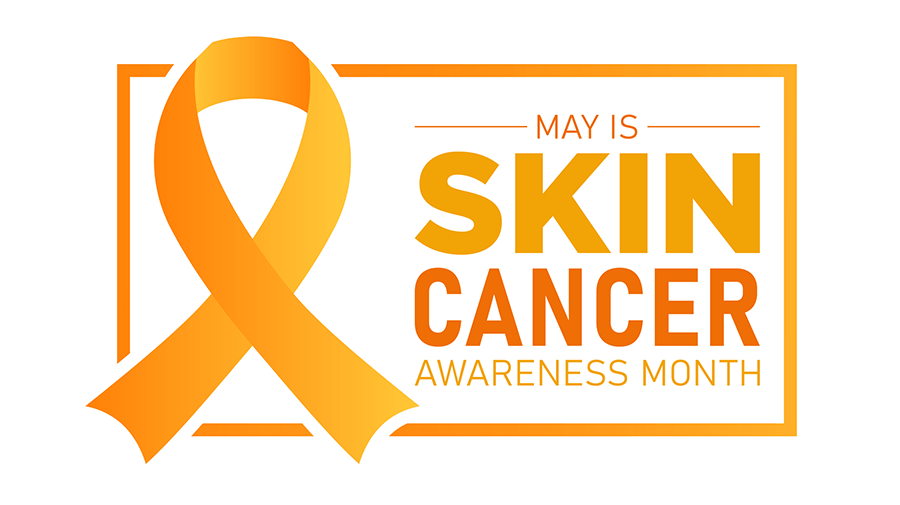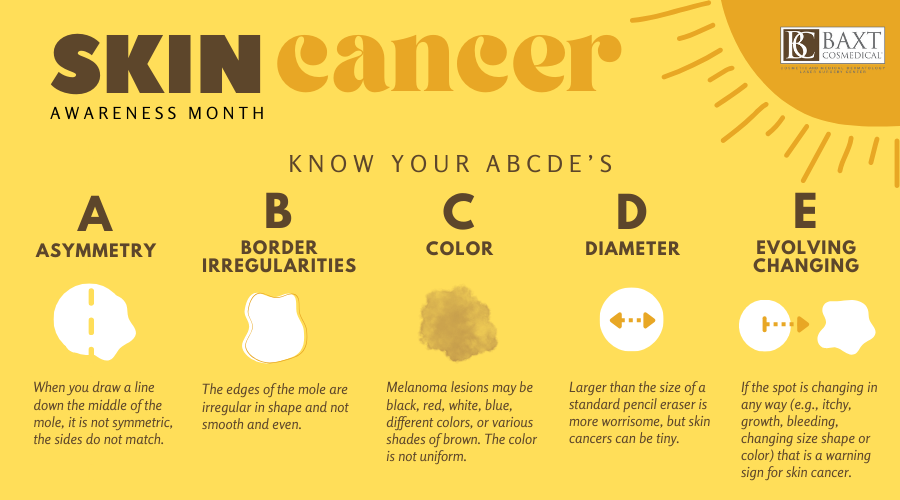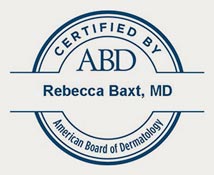
May is skin cancer awareness month, skin cancers inclues melanoma, basal cell skin cancer, and squamous cell skin cancer. Skin cancer is one of the most common types of cancer in the United States with more than 5 million people receiving this diagnosis each year!
According to estimates made from the National Cancer Institute’s Surveillance, Epidemiology, and End Results (SEER) Program, 100,640 Americans will be diagnosed with melanoma and about 8,290 people will die of the disease in 2024.1 According to age-adjusted rates for new melanoma of the skin, cases have been rising on average 1.1% each year over 2012–2021 as more and more younger people being diagnosed.
There is much we can do to prevent, treat, and cure skin cancer! To learn how, read Dr. Rebecca Baxt’s Skin Cancer Prevention Recommendations below and listen to the Dr. Rebecca Baxt Podcast. During her latest episode, “ABCDEs of Skin Cancer,” she will explain how you can minimize your skin cancer risks.
Dr. Rebecca Baxt’s Skin Cancer Prevention Recommendations
- The most important recommendation…Stay out of the sun! Most skin cancers are related to ultraviolet (UV) sun exposure, so avoid the peak rays from 10 AM to 4 PM.
- Wear a high quality sunblock of SPF 30 or above, and reapply often.
- Wear a hat and sunglasses when outdoors.
- Cover up your back and shoulders with a thick t-shirt or towel while out in the sun for long periods.
- See your dermatologist for a skin cancer screening yearly, if possible.
Listen to Dr. Baxt’s Podcast on What to Expect at Your Skin Cancer Screening | Board Certified Dermatologist, Skin Exam
ABCDEs of SKIN CANCER

Annual Skin Cancer Screening
Not everyone has access to a dermatologist, and even if you go yearly, skin cancers can creep up quickly on occasion.
So, if you see anything unusual on your skin that is:
- New or changing in size, shape and/or color
- Growing
- Itching
- Bleeding
Go to a dermatologist or general doctor as fast as you can!
In my office, when there is a changing lesion, I will see patients within 1-2 days typically, but not everything new or changing is cancerous and sometimes people are away or not near a medical facility so I will also often use a two-week rule. If the lesion has not disappeared or gone back to the way it was within two weeks, then it is time to see a doctor. At times, a mole can become irritated while shaving, or a bruise that pops up quickly and you do not remember hitting into anything, these are things that typically get better within two weeks.
Remember, everyone can get skin cancer, no matter what skin complexion. Skin cancer is usually slow growing in most cases, so we often have time to catch it. Caught early, skin cancer is generally completely curable, often with localized surgery.
Dr. Baxt encourages everyone to get screened annually because the good news is that when detected early, the 5-year survival rate for melanoma is 99%!
 Dr. Rebecca Baxt is a board-certified dermatologist who has completed extensive education and clinical training, as well as specialized training in her areas of expertise. Dr. Rebecca Baxt holds memberships and fellowships in many professional organizations. Schedule a consultation with Dr. Baxt for your dermatological medical or cosmetic concerns. Her cosmetic and medical dermatology office is located in Paramus, NJ (serving Bergen County, NJ communities).
Dr. Rebecca Baxt is a board-certified dermatologist who has completed extensive education and clinical training, as well as specialized training in her areas of expertise. Dr. Rebecca Baxt holds memberships and fellowships in many professional organizations. Schedule a consultation with Dr. Baxt for your dermatological medical or cosmetic concerns. Her cosmetic and medical dermatology office is located in Paramus, NJ (serving Bergen County, NJ communities).
EXPERT ADVICE FROM DR. REBECCA BAXT
- Why You Need An Annual Skin Cancer Screening
- Skin Cancer Awareness: The Truth Behind This Disease
- Top 5 Sunscreen Rules to Avoid a Sunburn
1 May Is Melanoma And Skin Cancer Awareness Month, American Association for Cancer Research

